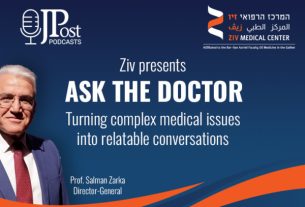The health ministry recently released its annual quality metrics report for hospitals in Israel for 2023. This report is published yearly and reflects the level of care in medical centers across Israel for a wide range of life-threatening medical conditions.
Dr. Anat Ekka Zohar initiated the national quality metrics program about 11 years ago. The program’s goal is to display the quality of medical care in Israel by measuring various parameters. The program started by examining five metrics, which led to significant improvements in the quality of care. Over the years, the program has expanded to measure 82 parameters.
In the past year, new metrics were introduced in the general medical field, including preventive antibiotic treatment for knee or hip replacement surgeries, chemotherapy treatment for colon cancer patients, vascular physician consultation before diabetic foot amputation, and telephone guidance for performing CPR. Unlike previous years, the ministry decided not to give an overall score to hospitals this year after complaints that these scores damage their reputation and do not reflect the variance in the scores of the many parameters examined. Therefore, the scores for each test parameter were published separately.
Key findings of the report
Emergency Rooms: The health ministry set a target for triage speed: the nurse check-up time in the emergency room from arrival should not exceed 12 minutes. The fastest hospital is Laniado Hospital in Netanya, where the average triage time is 4 minutes. Other top hospitals for emergency room check-up speed include the Galilee Medical Center in Nahariya, which has a 5-minute wait, and Ichilov Hospital in Tel Aviv, which has a 6-minute average nurse check-up time. The hospital that exceeded the target is Barzilai Medical Center in Ashkelon, with a 13-minute wait for a nurse check-up from arrival.
Stroke: Another key metric examined for years is the diagnosis and treatment of suspected stroke events. The health ministry stated that the time from hospital entry to performing a CT or MRI scan for patients suspected of having a stroke should not exceed 25 minutes. Hospitals that exceeded the target include Kaplan Medical Center in Rehovot with a 62-minute wait for the scan, the Holy Family Hospital in Nazareth with a 31-minute wait, and Hillel Yaffe Medical Center in Zichron Ya’acov with a 29-minute average wait for the scan. The fastest hospitals are Assuta Hospital in Ashdod, with a 19-minute wait, and Hadassah Ein Kerem in Jerusalem, with a 21-minute wait.
Infant Vaccinations: The report also examined the performance of Well-Baby Clinics (Tipat Halav) in various metrics, revealing significant gaps between the health ministry’s targets and actual care. The report shows that Well-Baby Clinics in health funds, the health ministry, and the municipalities of Jerusalem and Tel Aviv do not meet the vaccination targets for infants up to one year old. The lowest vaccination rates were found in the Leumit Health Fund and Well-Baby Clinics of the Jerusalem Municipality.
Pregnant Women: Within the metric for identifying women suffering from postpartum depression, only Clalit Health Services and Maccabi Healthcare Services managed to meet the health ministry’s target of 90%, while other Well-Baby Clinics scored low in performing postpartum depression assessments. Similarly, low scores were achieved in the metric for screening for violence against women.
The report also addressed various performances of Magen David Adom (MDA), the latest being the provision of telephone guidance for performing CPR during suspected cardiac arrest. In this parameter, MDA did not reach the target in all stations across the country. In other metrics, including heart attack treatment, stroke patient evacuation, and performing ventilation during resuscitation, MDA met the required targets.
Regarding this matter, Health Minister Uriel Boso stated, “As we learn lessons, draw necessary conclusions, and integrate them into work plans, we can continue to strengthen the healthcare system and improve care.”
Additionally, Health Ministry Director General Moshe Bar Siman Tov commented, “The entire Israeli healthcare system mobilized this year to treat war casualties, both physically and mentally. Despite the significant difficulties and burdens, the medical teams have managed to meet all the metrics similar to the previous year.”

